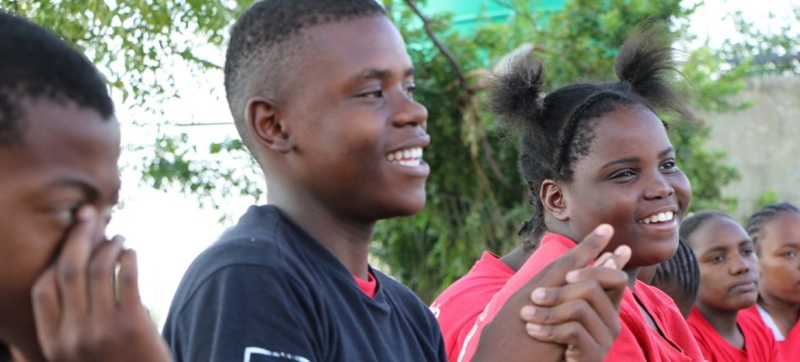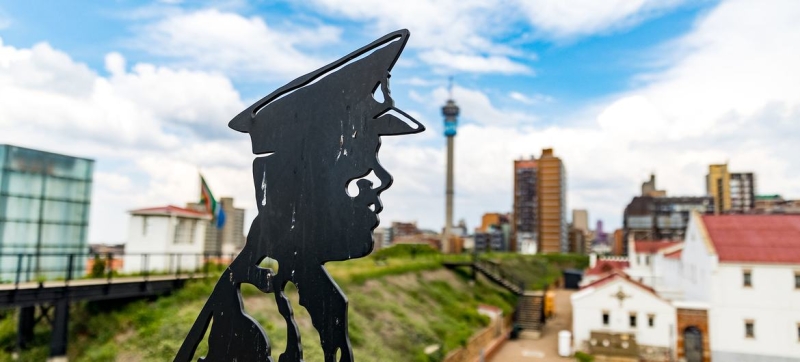
A group of students taking part in a discussion on racism held in Johannesburg with the support of the UN Human Rights Office. Decolonizing the Mind: How South Africa Combats Racism and the Legacy of Apartheid Human rights
Rethabile Ratsomo says it’s the little things that remind her of her “place” in South African society. Verbal abuse and side-eyes at work, where she is viewed as employed by the Black Economic Empowerment program and therefore unable to perform her duties. Derogatory comments from colleagues who say her English is “good.” She experiences these types of microaggressions on a daily basis.
“Even though I was born free after democracy in South Africa, my race continues to influence my life,” says the 29-year-old activist. She emphasizes that racism remains widespread in the country: “Many people continue to accept racial discrimination as normal.”
The legacy of apartheid
Thirty years later Since the end of apartheid, South Africa is still struggling with its legacy. Lack of equal access to education for all, unequal pay, segregated communities and huge economic inequalities persist. How is it that racism and its attendant discrimination continue to exist in a country that is majority black and governed by blacks?
Racism is deeply ingrained in the economic and social structure of South Africa . It is a legacy of apartheid and colonialism, emphasizes Abigail Noko, representative of the UN Human Rights Office (OHCHR) regional office in South Africa.
“Dismantling such entrenched racist and discriminatory systems requires commitment, leadership, dialogue and advocacy to implement anti-racist policies that advance human rights and provide a framework for correcting injustice and promoting equality,” Noko said.
Decolonizing Consciousness
A project to dismantle racist systems in a place like South Africa , must go hand in hand with the process of decolonization – both at the institutional and individual level, says Professor Tshepo Madlingozi, representative of the South African Human Rights Commission.
“History has shown that if you have not “decolonized” your consciousness, you will become an oppressor again and again,” he said.
Madlingozi took part in a discussion on dismantling racist systems in South Africa, which took place in Johannesburg in March during the Human Rights Festival, supported by OHCHR.
During the discussion, 20-year-old activist Samkelo Mkhomi also spoke about the need to first change mindsets, especially among young people. She said many of her peers, born into South Africa’s democracy, are distrustful and suspicious of other races. She specifically mentioned a friend of hers who doesn’t trust all white people. When Mkhomi asked why, he replied: “Because of what they did in the past.” Mkhomi believes that such thinking is a stumbling block on the path forward.
“We have ideas and stereotypes that we inherit from our family based on their social experiences—experiences that are not our own,” Mkhomi said. “And we used them as a model to form opinions about other people.” Once young people can get rid of this, I think we can start moving forward and dismantling racism.”
The country with the deepest economic inequality
The legacy of apartheid is still reflected in economic inequality: a 2022 World Bank report named South Africa as the country with the worst social delamination. 80 percent of the country’s wealth is in the hands of 10 percent of the population. At the same time, the country’s black residents are most numerous in the poorest category of the population.
“The legacy of colonialism and apartheid, rooted in racial and spatial segregation, continues to increase inequality,” the report’s authors emphasized.

A sculpture depicting a policeman next to the prison in Johannesburg, where the legendary anti-apartheid fighter Nelson Mandela served his sentence.
Material differences reinforce the idea of racial differences
The “evil genius” of apartheid was the segregation project because it allowed the government not only to separate people based on arbitrary classifications, but through this to create material differences between communities to further reinforce the idea of racial difference, says Tessa Dooms, director of the nonprofit Rivonia Circle. which deals with issues of poverty, unemployment and inequality.
“The apartheid government didn’t just assign categories to people, it gave those categories real, material meaning,” Dooms said during the discussion. “As long as these categories mean something in the world, we still have something to work on: eliminating apartheid, colonialism, decolonization.”
She called on privileged groups to work towards equality. Until those with privilege work to expand access to it for other populations, the cycle will continue, she added.
“We cannot leave creating a more just world to the people who suffer the most from injustice,” she said.
How countries can fight racism
South Africa has come a very long way towards freedom and has gained an international reputation as a leader in global efforts to combat racism. In 2001, South Africa hosted the World Conference against Racism, Racial Discrimination, Xenophobia and Related Intolerance, which resulted in the Durban Declaration and Program of Action. This declaration provides a road map providing concrete measures for states to combat racism, xenophobia and intolerance.
One of the main recommendations is that each country develop its own National Action Plan in this area. In this way, governments can document their commitment to take concrete action to combat racism.
South Africa launched its national plan in 2019 with support from the OHCHR Country Office.
“Human rights play a critical role in eliminating racism by providing a framework for examining and correcting historical injustices, promoting equality and ensuring that all people are treated with fairness and dignity,” Noko said .
The fight against the legacy of apartheid in South Africa is also carried out at the legislative level. For example, the Employment Equity Act 2020 was passed.
“The starting point in challenging and dismantling systemic racism is understanding that being anti-racist is not just about being against racism,” says Ratsomo.
“It also means being active and speaking out against racism whenever you encounter it. The more we understand the problem of racism, the easier it is for us to identify it, speak out and act against it,” she adds.
Read also:
